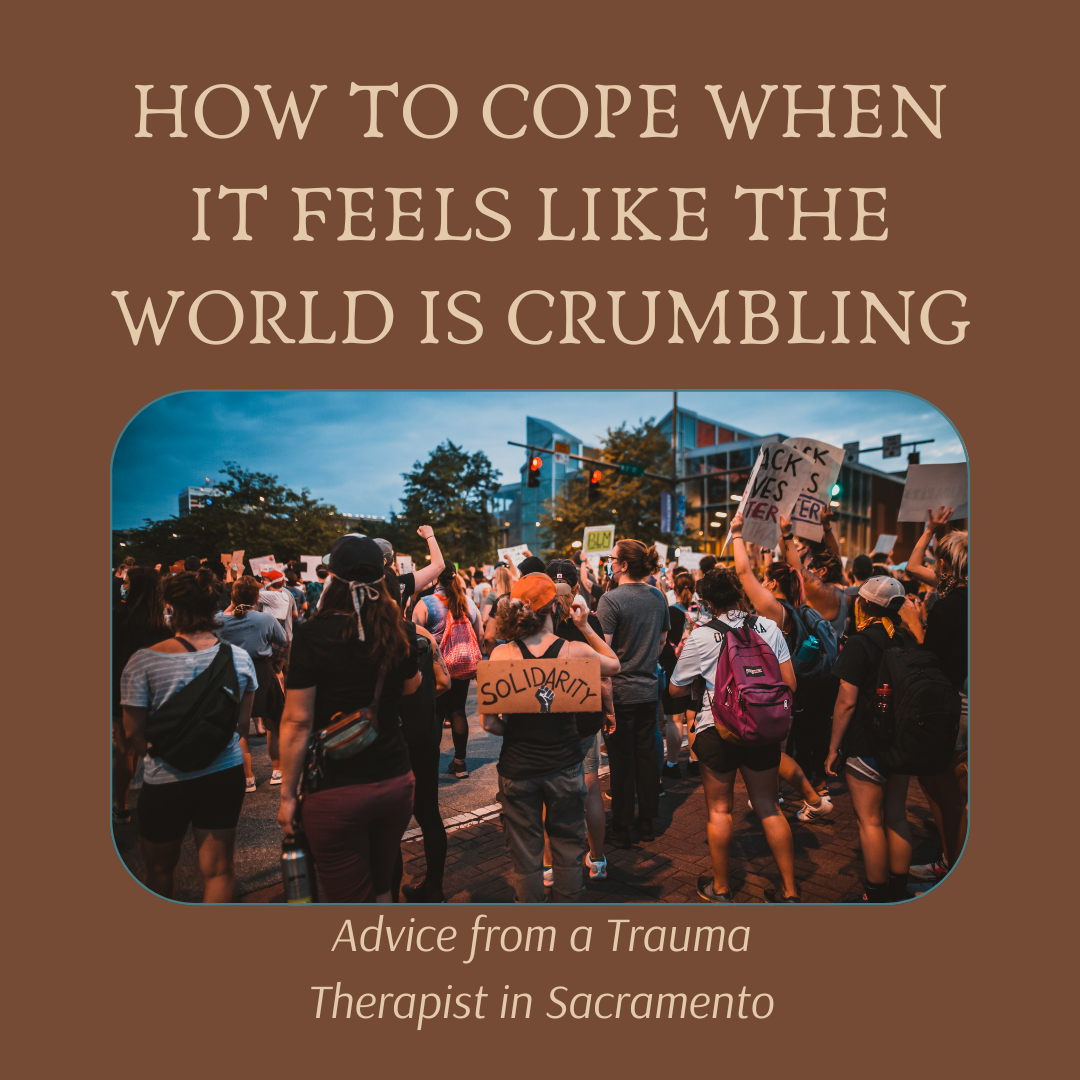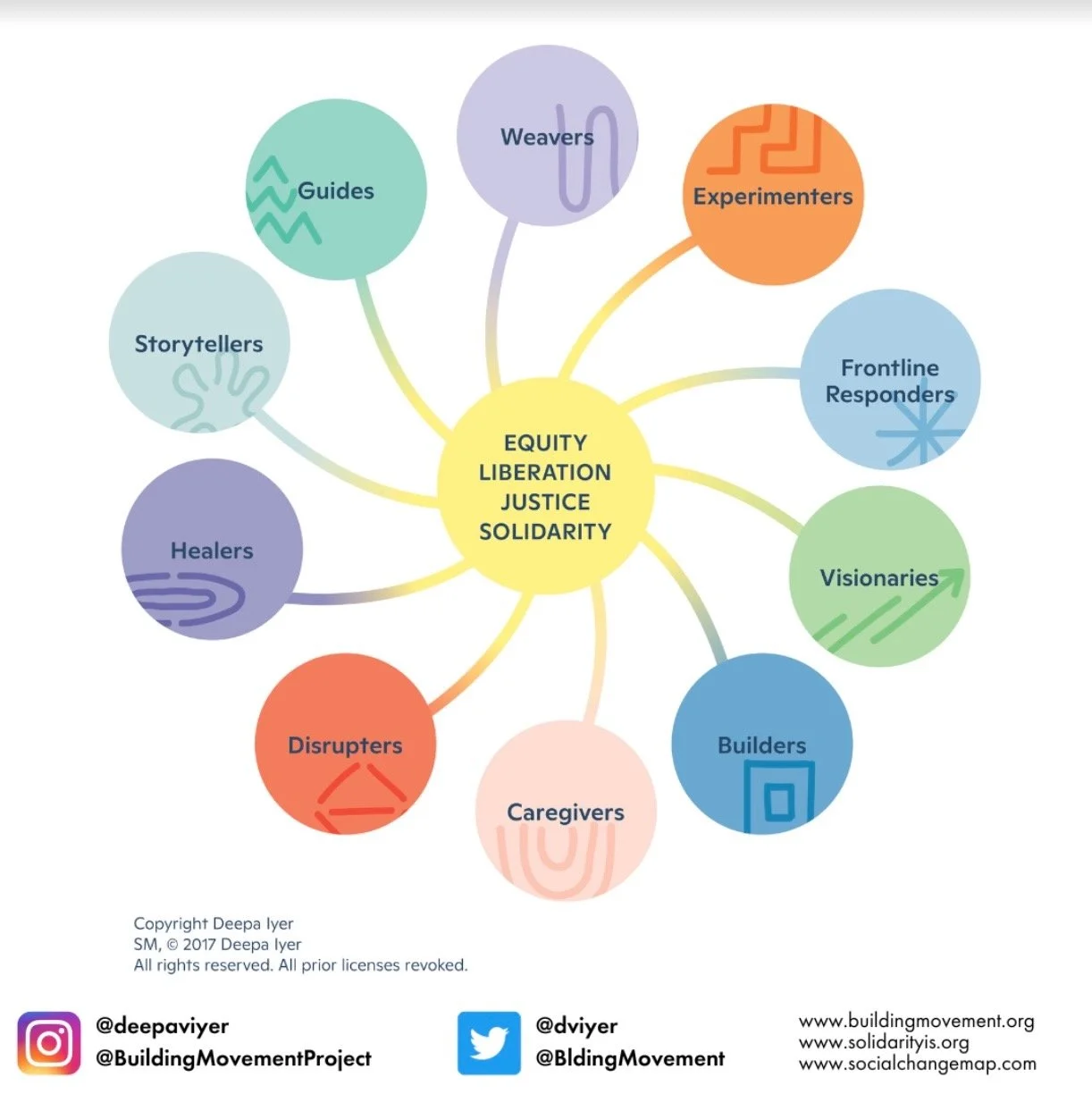How to Cope When It Feels Like the World is Crumbling: Advice from a Trauma Therapist in Sacramento
/What a time to be alive!
I’m a trauma therapist in Sacramento and I’m deeply disheartened by what’s going on in our country and in the world.
I don’t need to tell you that there are horrifying things are happening. You already know. Many of us are experiencing collective grief with emotions ricocheting from fear to deep wells of sadness to fury, righteous indignation, hopelessness and despair, and back again.
The questions I’ve been grappling with (and don’t have a perfect answer to) are: How do I stay informed about what’s happening in the world and help in the ways I can without completely frying my nervous system or burning myself out? How do I stop myself from sticking my head in the sand when I feel helpless and overwhelmed?
And how do I balance trying to show up for the collective with taking care of myself and the ever-present, just-part-of-being-human challenges of my personal life? I’m on my own ongoing healing journey, and helping my trauma therapy clients heal, and yet the world at large is in such desperate need of healing too.
Like I said, I don’t have a perfect answer, but I have a few ideas. Let’s jump in.
Set Limits with Media Consumption
I think it’s important to create healthy boundaries for all forms of media consumption, but in this post I’m talking about news consumption in particular. When unmoderated, I believe it can be one of the biggest daily contributors to negative mental health effects.
In decades past, before our lives became so digital, people got information about current events from print newspapers that were delivered once a day, or a one-hour nightly news program. I think of that way of consuming information as like drinking a glass of water—a digestible single serving. Now, in 2025, getting the news is like trying to drink from a firehose.
If you don’t want to get your face blasted off (or to be riddled with anxiety) you’re going to have to approach the news with more intention and make more conscious decisions.
Please stop doomscrolling. It’s not helping your mind or your heart, and it’s not helping your fellow humans or the planet. Social media algorithms are set up to get as much of your time and attention as possible with fearmongering and anger-inducing, provocative content.
(For more on this, I recommend the book Stolen Focus: Why You Can’t Pay Attention—and How to Think Deeply Again. It’s also available at the Sacramento Public Library.)
So now that you know the ‘why’ of limiting news media consumption, here are some more practical tips for the ‘how’:
Limit time/frequency: I highly suggest you set a maximum for your news consumption. Maybe it’s 15 minutes a day. Maybe it’s an hour, once a week. You may have to experiment to figure out what works best for you. You can set app limits on your smartphone for apps you use to get the news if you need an external reminder to stick to the plan.
Decide which format works best for you: Would you prefer to read the news in writing, listen to it in an audio format, or watch a video? For myself, I’ve found that video is much more likely to get my nervous system hyperactivated (a.k.a. stress me out), whereas writing is easier for me to consume without negative effects, and audio, like a podcast, is somewhere in between. You may feel completely differently, so again, experiment.
Some other considerations with format are choosing a news source that is as unbiased as possible, and considering whether long-form or short-form content works better for you. For example, you may prefer to read one long article or watch one long video that goes in depth on a single topic rather consuming several shorter pieces or media that jumps around to several different stories.
Plan in aftercare: Even when I consume news media in my ideal format, I still get a little emotionally dysregulated. For me and many others, it’s unavoidable. I’m simply not going to read about people suffering and threats to democracy and then feel light and energized afterwards. Knowing that I’ll feel heavy afterwards, I plan a self-soothing activity for after I’m done to help myself get back to a more grounded, emotionally regulated place.
Part of a good aftercare plan is choosing a more ideal time (as in time of day or day of the week) for your news consumption. Maybe you avoid watching the news first thing in the morning because it sets the tone for your day. Or maybe you realize that evenings aren’t good for news consumption because it causes you to ruminate and impacts your sleep. As with the other advice, play around to find your right fit.
A bonus tip is to balance news about the suffering going on in the world with uplifting stories. Check out Upworthy - GOOD PEOPLE: Stories From the Best of Humanity (also available at Sacramento Public Library). You can also find Upworthy on all social media platforms.
Take Action
I’ve shared in previous blog posts about the need to balance inputs with outputs, and consumption with creativity. Those principles apply here too. In this case, creativity just means doing something. Anything. A small action can both aid the causes that are meaningful to you and also restore your sense of agency (vs. feeling helpless).
Here are a couple of ways you can help:
Use the 5 Calls app to call your representatives and senators. Calling is the best way to make your voice heard and the app makes it easy by automatically finding your representatives based on your location and providing you with their phone numbers as well as scripts for what to say. You can easily search and find the issues that are most important to you.
Bonus tip from the 5 Calls website for those of you who have social anxiety and/or just hate talking on the phone: “Calling on evenings and weekends with the intent of leaving a voicemail is still a great way to make your voice heard.” Just make sure to leave your full street address to ensure your call is tallied.Consider making a donation to a charity that is helping with one of the issues that’s close to your heart. I stand in solidarity with Palestine and these are a few registered non-profits that are helping people in Gaza:
I learned about Watermelon Sisters from a friend. They are serving children and families by providing food, water, hygiene products, mental health counseling, and more.
Heal Palestine is another organization providing healthcare, education and aid.
World Central Kitchen provides fresh meals to the frontlines.
One more thing I’d like to add on the topic of how to do your part is Deepa Iyer’s Social Change Ecosystem Map framework:
Deepa Iyer, Building Movement Project. SM, © 2020 Deepa Iyer. All rights reserved. All prior licenses revoked.
In Deepa’s framework, you can support your values and the causes that matter to you by playing different roles.
My role may be different than your role, which may be different than your best friend’s role. But all of the roles are needed, valuable, and contribute to the cause.
We don’t all have to be out there on the front lines. As a trauma therapist, I inhabit the roles of healer and guide.
Check out Iyer’s guide to the Social Change Ecosystem Map framework here, where you can read descriptions of the roles as well as explore reflection questions to help you choose your role(s) and identify how you can best show up for your community.
Joy as an Act of Resistance
If you know me then by now you should know I’m all about feeling your feelings—processing your emotions, metabolizing them, and letting them move through your body. Honoring the messages they’re sending you. I’m firmly against suppressing your emotions through spiritual bypassing or toxic positivity.
With that said, my tough love message for you today is that you being miserable will not help the people who are suffering. And I believe the oppressor wins if they’re able to steal the joy that is your birthright, the joy that comes from the simple pleasures in life and is always available to us.
I’m still dancing like no one’s watching to one song at a time. Still sitting in the park with my feet in the grass, still playing catch. Still enjoying the way the breeze feels on my skin and the way my tastebuds sing at the first bite of one of my favorite foods.
There’s room for both. I’m constantly talking to my trauma therapy clients about how multiple (sometimes seemingly contradictory) emotions can exist at the same time. So feel disheartened, feel angry, feel overwhelmed. Let it pass through you. And also, when joy comes to visit you, embrace it. Welcome it in and spend some time with it. Don’t usher it away.
“The work of the mature person is to carry grief in one hand and gratitude in the other and to be stretched large by them.”
Additional Support: Trauma Therapy in Sacramento
Being alive and aware in 2025 is a lot. You cannot carry the heaviness of the state of the world on your own. We all need support. If you have adequate support from your loved ones and/or your community, that is a wonderful resource that will help you be more resilient in the face of all this.
But many of us don’t have that, or could use more focused, individual support. If that sounds like you, you might consider coming to therapy. At my Midtown Sacramento office location, I help my clients process their grief and develop a plan for coping and self-care that’s tailored to their unique needs.
This is a collective trauma, the mix of all that is happening right now. Some of us are impacted simply through the weight on our empathetic hearts, and others are impacted in more personal ways (for example, many of my clients are children of immigrants, or immigrants themselves).
Sometimes just talking about it isn’t enough, so I love using somatic techniques in addition to talk therapy, to help clients get the stored trauma, grief, and stress out of their bodies. Nervous system regulation has become kind of a buzzword these days, but in therapy I can break it down and show you practical strategies that use the wisdom of your body to help you feel better.
Contact me today to set up a free phone or video consultation for trauma therapy in Sacramento.




